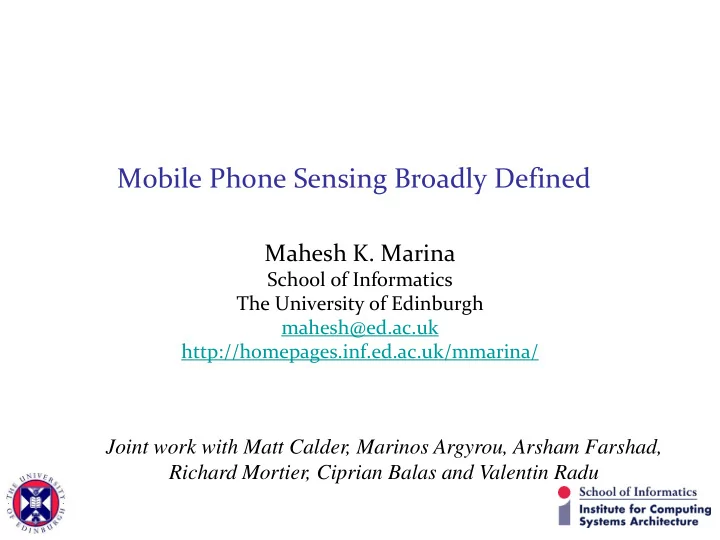

Mobile Phone Sensing Broadly Defined Mahesh K. Marina School of Informatics The University of Edinburgh mahesh@ed.ac.uk http://homepages.inf.ed.ac.uk/mmarina/ Joint work with Matt Calder, Marinos Argyrou, Arsham Farshad, Richard Mortier, Ciprian Balas and Valentin Radu
Modern Smartphone iPhone 4 Nexus S (Android) • Sensors: • Sensors: – Touchscreen – Touchscreen – 3-axis Accelerometer – 3-axis Accelerometer – (Dual) Camera (Video) – (Dual) Camera – (Dual) Microphone – (Dual) Microphone – Digital Compass – Digital Compass – 3-axis Gyroscope – 3-axis Gyroscope – Proximity sensor – Proximity sensor – Ambient light sensor – Ambient light sensor • A-GPS • A-GPS, NFC reader Applications are key drivers for new sensors getting added to phones 3
Interesting Examples CellScope (Berkeley) NETRA (MIT) 4
Can we expand the scope of sensing applications of mobile phones relying on what is already built in or likely to be integrated in near future? 5
Our Focus • UHF RFID reader integration for making the phone into a generic sensor data acquisition device – Environmental monitoring, esp. for low cost sensing in indoor environments with dense sensor tag deployments • (Explicitly) View Network Interface as a Sensor on Phone – Wireless monitoring (indoor, outdoor, WiFi, 3G) for client side view 6
What is the Energy Consumption Impact of UHF RFID Reader Integration with Mobile Phones? 7
Experimental Methodology (1) Three types of tags, incl. a Two types of compact semi-passive temperature readers logger tag Quark A528 8
Experimental Methodology (2) • HTC Magic (Android) phone • Digital multimeter + power supply setup • PC application for receiving & plotting power measurements over time 9
Impact of Reader Operations and Reader-Tag Separation 10
Impact of Reader “Q” Parameter Setting 11
Power vs. Energy Consumption . 12
13
Further Issues • Impact of non-ideal channel and environmental conditions (e.g., non-line-of-sight, orientation) • Adaptively choosing the Q parameter based on a predictive model • Reader scheduling / duty cycling 14
Summary • UHF RFID reader integration with mobile phones for low cost environmental monitoring • (Explicitly) View Network Interface as a Sensor on Phone for wireless monitoring • Crowdsourcing based sensing apps – Incentives and addressing privacy concerns key to real world adoption 15
Thanks!
Recommend
More recommend